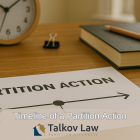San Marcos Real Estate Partition Lawyer
Talkov Law’s attorneys serving San Diego County are exceptionally experienced in California partition actions and have conducted over 470 for our satisfied clients. A California partition action is a law that allows co-owners of real property to divide the property among themselves. The partition statutes provide a legal mechanism for co-owners to divide the property without having to go through the court system. The partition statutes allow co-owners to divide the property either by agreement or by court order. If the co-owners cannot agree on how to divide the property, then the court will divide the property in a way that is fair and equitable to all parties. The partition statutes also provide that any partition of the property must be in accordance with the laws of the state of California. The legal effect of the partition statutes is that it provides a legal mechanism for co-owners to divide their property without having to go through the court system.
Our team of partition attorneys can assist co-owners with frequently asked questions about partitions, such as:
- Will there be a trial in a California partition action? Trials are extremely rare in partition actions because the interlocutory judgment procedure allows for a partition referee to be appointed by meeting just a few elements that rarely involve live testimony from witnesses. Even if a trial occurred, it would almost certainly relate only to the ownership interests or the distribution of proceeds, though most cases are decided on motion heard by the court based on the papers submitted by the parties.
- In a partition action, can I be reimbursed for paying more than my fair share of the down payment? Yes, partition actions allow for offsets whereby one co-owner claims excess payments for mortgage, taxes, insurance, improvements, repairs and other property expenses
- When is a partition action right for my dispute? Generally, parties who can reach their own resolution of a co-ownership dispute are not reading websites about partition law. If you are reading this article, chances are that your co-ownership dispute has reached a level where legal options are being considered. Filing a partition action will bring about a certain result to the co-ownership dispute, rather than letting it linger for years on end. However, if the parties are very close to a settlement, it may be wise to consider a resolution.
- What are the potential outcomes of a partition action? The most likely outcome in a partition action is that the plaintiff receives fair value for their interest in the property either through a sale to a third party or to the defendant. In rare cases, a property can be divided, through this is not applicable to single family residences with no surplus land.
- Can I recover my attorney’s fees in a partition action? Yes, you can recover your legal fees in a partition action through a motion for attorney’s fees. However, most partitions settle, and most settlements involve a walk-away of attorney’s fees, meaning it important to hire a partition attorney who will handle the matter efficiently since each party is likely to pay their own fees.
San Marcos is a city in the North County region of San Diego County, California. It is located in the San Marcos Valley, just east of the city of Carlsbad. The city is home to California State University San Marcos, Palomar College, and the University of St. Augustine for Health Sciences. San Marcos is known for its vibrant downtown area, which features a variety of restaurants, shops, and entertainment venues. The city is also home to several parks, including Walnut Grove Park, Double Peak Park, and Discovery Lake. San Marcos is a great place to live, work, and play, and is a popular destination for visitors from all over the world.
Speak to Our San Marcos Partition Attorneys Today
Call our San Diego County Partition Attorneys today to end your co-ownership dispute. You don’t pay until the house is sold!
Call us at (760) 999-3300 or contact us below to schedule a free, 15-minute consultation
Hamilton v. MacDonald – Partition Action Case Study
In the legal case of Hamilton v. MacDonald, 503 F.2d 1138 (1974), the issue was whether a partition of real property was proper. The dispute arose when the plaintiff, Hamilton, and the defendant, MacDonald, inherited a parcel of real property from their father. Hamilton wanted to partition the property, while MacDonald wanted to keep it intact. The court had to decide whether the partition was proper under the applicable state law. The court ultimately held that the partition was proper, as the state law allowed for the partition of real property in certain circumstances.
Frequently Asked Questions About Partitions in San Marcos
How Much Does a Partition Action Cost in San Marcos?
The costs of a partition action—including attorney fees, court fees, appraiser fees, and other legal expenses—are typically around $20,000. While some cases may incur fees as low as $5,000 or exceed $20,000, depending on their complexity, these expenses are generally shared among the co-owners. The court may also adjust the distribution of these costs based on each party’s level of involvement or responsibility, ensuring a fairer allocation when needed.
Who Can File a Partition Action in San Marcos?
A partition action can be filed by any co-owner of a property, excluding married couples who own it as community property. A majority ownership is not required to initiate a partition action. Common situations for partition actions include disputes among siblings inheriting property, former romantic partners, friends or family members who purchased property together, and divorced couples.
Who Pays for a Partition Action?
In San Marcos, each party typically pays for their own attorney’s fees (known as the “American Rule”). However, California partition law allows for an exception to this rule, stating that “the court shall apportion the costs of partition among the parties in proportion to their interests or make such other apportionment as may be equitable.” California Code of Civil Procedure 874.040. Indeed, the court may award “reasonable attorney’s fees incurred or paid by a party for the common benefit.” California Code of Civil Procedure 874.010(a).
Can a Partition Action Be Stopped in San Marcos?
Generally, a partition action cannot be stopped, but a defendant may be able to buy time to seek a resolution. Eventually, however, the plaintiff can generally force the sale of the property based on the absolute right to partition.
Contact our Team of Experienced Partition Lawyers Serving the City of San Marcos, County of San Diego, California
Our San Marcos partition litigation attorneys will work diligently to obtain a favorable outcome on your behalf, whether by negotiation or litigation. Talkov Law Partition Attorneys unlocks access to justice for co-owners by funding your case. For qualified cases, you pay no fees until we successfully partition your property by obtaining a sale on the market or to your co-owner! For a free consultation with California’s first and largest team of partition attorneys at Talkov Law, call (760) 999-3300 or contact us online today.
Talkov Law San Diego Office
11622 El Camino Real Ste 100
San Diego, CA 92130
Phone: (858) 800-3300
































































































































